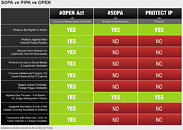- Joined
- Oct 9, 2007
- Messages
- 47,435 (7.51/day)
- Location
- Hyderabad, India
| System Name | RBMK-1000 |
|---|---|
| Processor | AMD Ryzen 7 5700G |
| Motherboard | ASUS ROG Strix B450-E Gaming |
| Cooling | DeepCool Gammax L240 V2 |
| Memory | 2x 8GB G.Skill Sniper X |
| Video Card(s) | Palit GeForce RTX 2080 SUPER GameRock |
| Storage | Western Digital Black NVMe 512GB |
| Display(s) | BenQ 1440p 60 Hz 27-inch |
| Case | Corsair Carbide 100R |
| Audio Device(s) | ASUS SupremeFX S1220A |
| Power Supply | Cooler Master MWE Gold 650W |
| Mouse | ASUS ROG Strix Impact |
| Keyboard | Gamdias Hermes E2 |
| Software | Windows 11 Pro |
Forgive my use of internet jargon, but after the epic fail that SOPA/PIPA legislations suffered after being faceplanted by everyone from Jimmy Wales to your neighborhood lolcat, Freedom and Democracy Corporation (read: US Congress) is working on a new legislation introduced by Rep. Darrell Issa (R-Cali.), which he claims will plug the shortcomings of SOPA and PIPA.
The bill is meticulously named OPEN (riding on the "keep web open" moniker), the Online Protection and Enforcement of Digital Trade Act., (H.R. 3782), was introduced in the U.S. House of Representatives on Wednesday (01/18), the same day as an Internet protest when a number of high-profile websites such as Wikipedia went dark. Senator Ron Wyden (D-Oregon) has introduced the OPEN Act in the U.S. Senate. OPEN is essentially similar to SOPA, except that the discretionary authority that will address IP infringement complaints will be the International Trade Commission (ITC), instead of US Department of Justice. This would also make the legislation palatable to the international community which has been concerned over US' unilateral actions on the very functioning of the internet.

Says Rep. Darrell Issa, "If the ITC investigation finds that a foreign registered website is 'primarily' and 'willfully' infringing on the IP rights of a U.S. rights holder, the commission would issue a cease and desist order that would compel payment processors (like Visa and Paypal) and online advertising providers to cease doing business with the foreign site in question. This would cut off financial incentives for this illegal activity and deter these unfair imports from reaching the U.S. market."
The likes of Google, Facebook, LinkedIn, Twitter, have expressed satisfaction with the bill, however the Motion Pictures Association of America (MPAA) is not very happy, as it thinks it goes too soft on pirates. The fine-print of the bill can be accessed here (PDF).
View at TechPowerUp Main Site
The bill is meticulously named OPEN (riding on the "keep web open" moniker), the Online Protection and Enforcement of Digital Trade Act., (H.R. 3782), was introduced in the U.S. House of Representatives on Wednesday (01/18), the same day as an Internet protest when a number of high-profile websites such as Wikipedia went dark. Senator Ron Wyden (D-Oregon) has introduced the OPEN Act in the U.S. Senate. OPEN is essentially similar to SOPA, except that the discretionary authority that will address IP infringement complaints will be the International Trade Commission (ITC), instead of US Department of Justice. This would also make the legislation palatable to the international community which has been concerned over US' unilateral actions on the very functioning of the internet.

Says Rep. Darrell Issa, "If the ITC investigation finds that a foreign registered website is 'primarily' and 'willfully' infringing on the IP rights of a U.S. rights holder, the commission would issue a cease and desist order that would compel payment processors (like Visa and Paypal) and online advertising providers to cease doing business with the foreign site in question. This would cut off financial incentives for this illegal activity and deter these unfair imports from reaching the U.S. market."
The likes of Google, Facebook, LinkedIn, Twitter, have expressed satisfaction with the bill, however the Motion Pictures Association of America (MPAA) is not very happy, as it thinks it goes too soft on pirates. The fine-print of the bill can be accessed here (PDF).
View at TechPowerUp Main Site


